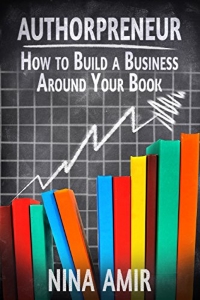 The vast majority of authors do not make a living from their books. Most traditionally published books never “earn back” their advances, which means the authors don’t sell enough copies to make any money past the initial fee paid for the manuscript. Most ebooks don’t sell more than about 550 copies per year, and only a few indie authors have enough book-related income to pay their bills with the royalties they earn.
The vast majority of authors do not make a living from their books. Most traditionally published books never “earn back” their advances, which means the authors don’t sell enough copies to make any money past the initial fee paid for the manuscript. Most ebooks don’t sell more than about 550 copies per year, and only a few indie authors have enough book-related income to pay their bills with the royalties they earn.
But that doesn’t mean you shouldn’t pursue authorship as a full-time career that earns enough income to pay all your bills…plus some. Indeed, you should. But approach this goal with a different mindset.
Don’t only hope to earn an income from book sales. Hope provides a positive attitude, but to earn a steady living as an author you must turn your book into a business.
Become an authorpreneur.
As you plan your book project, consider how to create related products and services that help promote book sales and bring in money 24/7. A nonfiction book easily can be turned into courses, talks, coaching programs, membership sites, and other products and services. Depending upon your creativity and energy level, the ways to build a business around your book are endless.
Authorpreneurs Earn a Living
Becoming an entrepreneur likely wasn’t high on your list of reasons for writing a book. But to make authorship your career, authorpreneurship will help you make bank.
 Keep this in mind as you conceptualize your book. Rather than deciding to build a business around your book after the book is released, make this decision in the early stages of the project. In other words, write your book for the purpose of creating steady income.
Keep this in mind as you conceptualize your book. Rather than deciding to build a business around your book after the book is released, make this decision in the early stages of the project. In other words, write your book for the purpose of creating steady income.
Focus the content of your book on what your readers, customers, or clients want and need, such as problems solved, questions answered, or pain eased. Provide a structure for you book that serves as the foundation for programs of all types.
For example, each of your chapters could spin off into teleseminars, webinars, workshops, online courses, social media challenges, speeches, or workbooks. Or you could develop chapters around specific steps, ways, or tools, and then, you could create programs or courses around these.
Additionally, if you can devise any type of repeatable system, you can use it to structure your book. Then use that system to support a coaching program or even a done-for-you service.
Nonfiction Lends Itself to Income from Products and Services
I didn’t set out to become an authorpreneur. All I wanted to do was write. However, I realized early on that creating products and services that related to my books would help me fund my writing. So, I threw myself into the effort to increase my income and earn money beyond book sales.
After the publication of The Author Training Manual, I created:
- the Nonfiction Writers’ University (NFWU) membership program.
- a variety of courses, including How To Write A Short Book Fast, Mind Mapping for Authors, and The Productive Writer, as well as those offered only in the NFWU, like Author Training 101-104.
- a book proposal template
- an Author Coaching service
After the publication of How to Blog a Book, I created:
- a blog-to-book coaching program (now included in Author Coaching).
- several blog-to-book courses, including Turn Your Blog into a Book Production Machine and Build a Business Around Your Blog.
I have created more programs, courses, and ebooks. Some of them, I never even got around to selling separately; they are included in larger programs. But they have helped me create an income related to but not from my writing. To date, my coaching and membership programs have brought in the most income.
Conversion Elements Lead to Income
When you write a book with related products and services in mind, you can include elements within the manuscript specifically meant to generate leads once the book is published. The most common conversion elements are “calls to action.”
For instance, in the content of your chapters or in the front or back matter of your book, you might make an offer that sends readers to your website. To receive your offer, they must provide you with an email address. This helps you grow your mailing list, which you can use to contact these “business prospects.”
Your calls to action might be for:
- A free teleseminar
- A free ebook
- A free course
- A downloadable whitepaper or report
- A ticket to an event
- A discount on a program
- A free consult
Share Resources and Hyperlinks
You also can include a variety of resources in your book. Do this with a page at the back of your book that lists your additional products and services, including ecourses, home-study courses, live events or courses, or membership sites. Or you can provide a link to a form that requests more information if they are interested in services, such as coaching.
Don’t forget the simplest conversion strategy: hyperlinks to web or landing pages where you sell your wares. While you can’t do this in a printed book, you can write out the URL; this allows readers to type it into a search engine and end up on your web or landing page.
Books may not always be big money makers for authors, but they can produce a career and an income—especially if you plan your book with this in mind. First, decide to become an authorpreneur. Then start writing your books with the goal of building a business around them.
How have you built a business around your book? Tell me in a comment below. And please share this post with another writer.
 Would you like to write and publish nonfiction, like articles, blog posts, books, or reports…and become a successful author? Join the Nonfiction Writers’ University. Get the basic education you need and the Author Coaching to help you succeed as a nonfiction writer. Enjoy a 30-day trial membership for only $1. If you’ve felt the desire to get coached and be supported as you pursue authorship, this program is for you. Participate in monthly group Author Coaching sessions and gain access to an extensive archive of writing and publishing resources.
Would you like to write and publish nonfiction, like articles, blog posts, books, or reports…and become a successful author? Join the Nonfiction Writers’ University. Get the basic education you need and the Author Coaching to help you succeed as a nonfiction writer. Enjoy a 30-day trial membership for only $1. If you’ve felt the desire to get coached and be supported as you pursue authorship, this program is for you. Participate in monthly group Author Coaching sessions and gain access to an extensive archive of writing and publishing resources.
Photo courtesy of milkos.